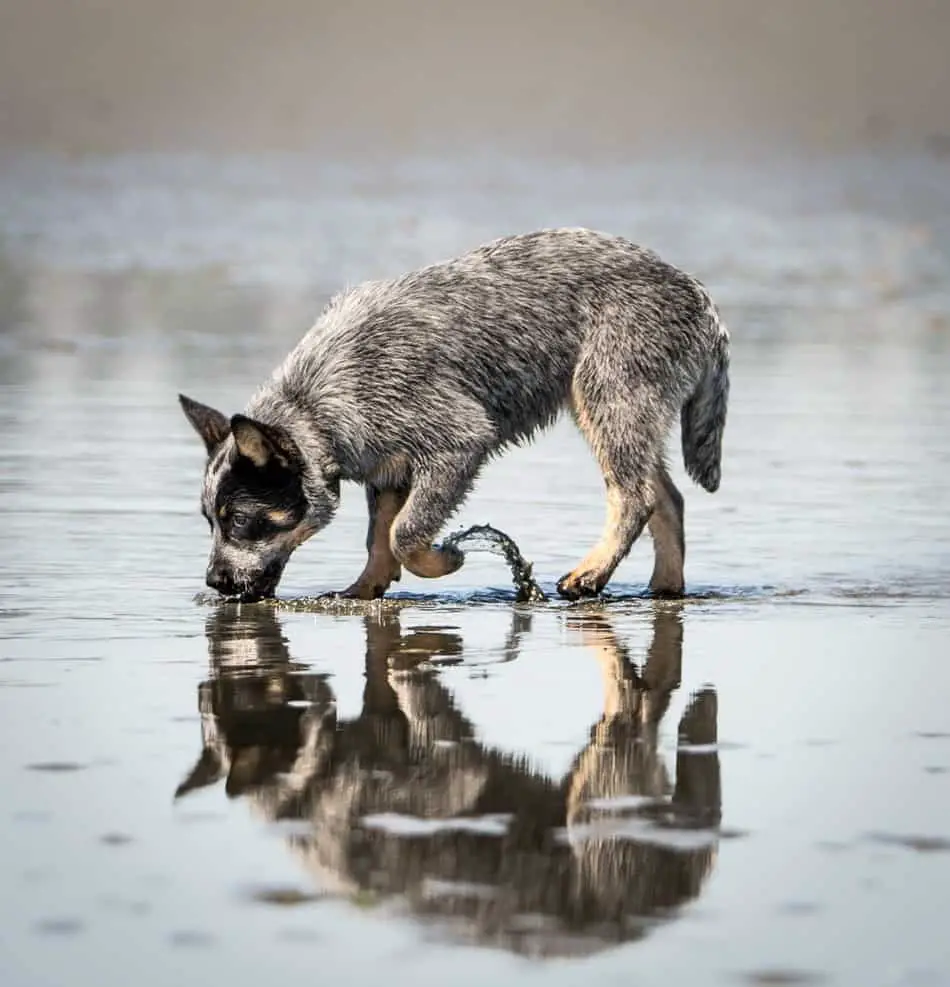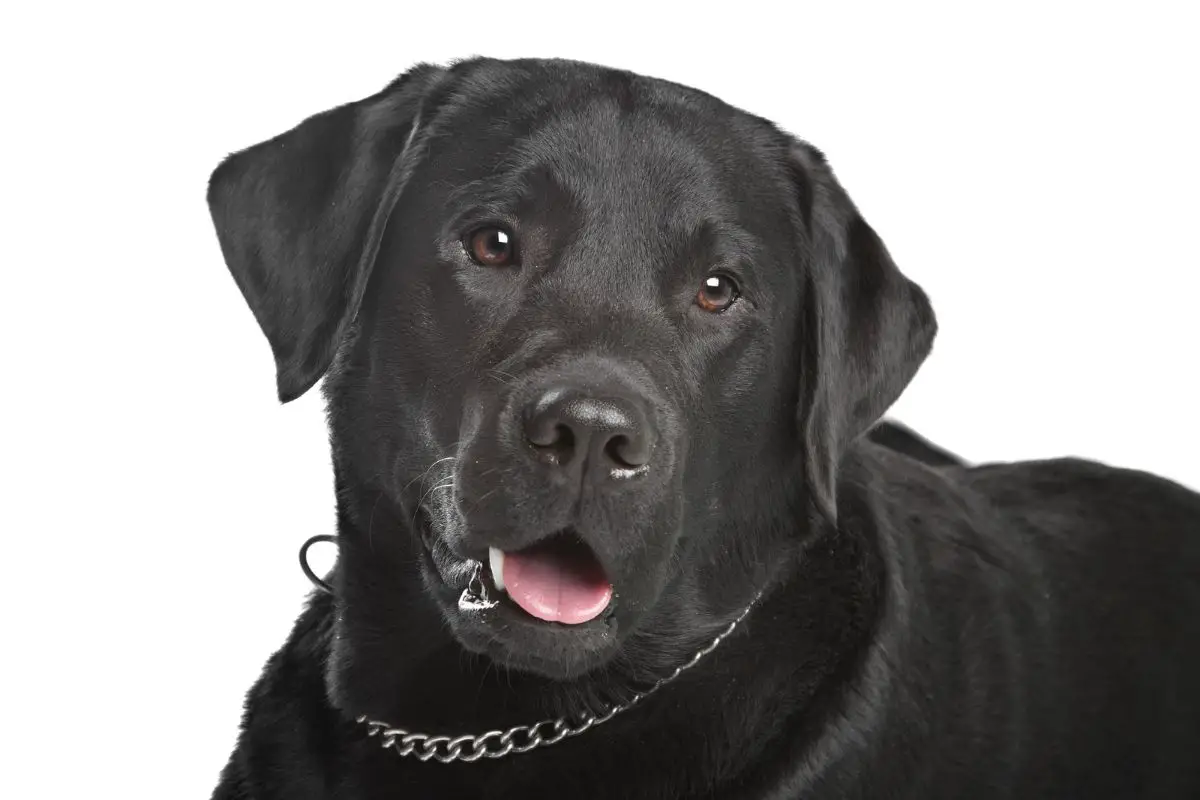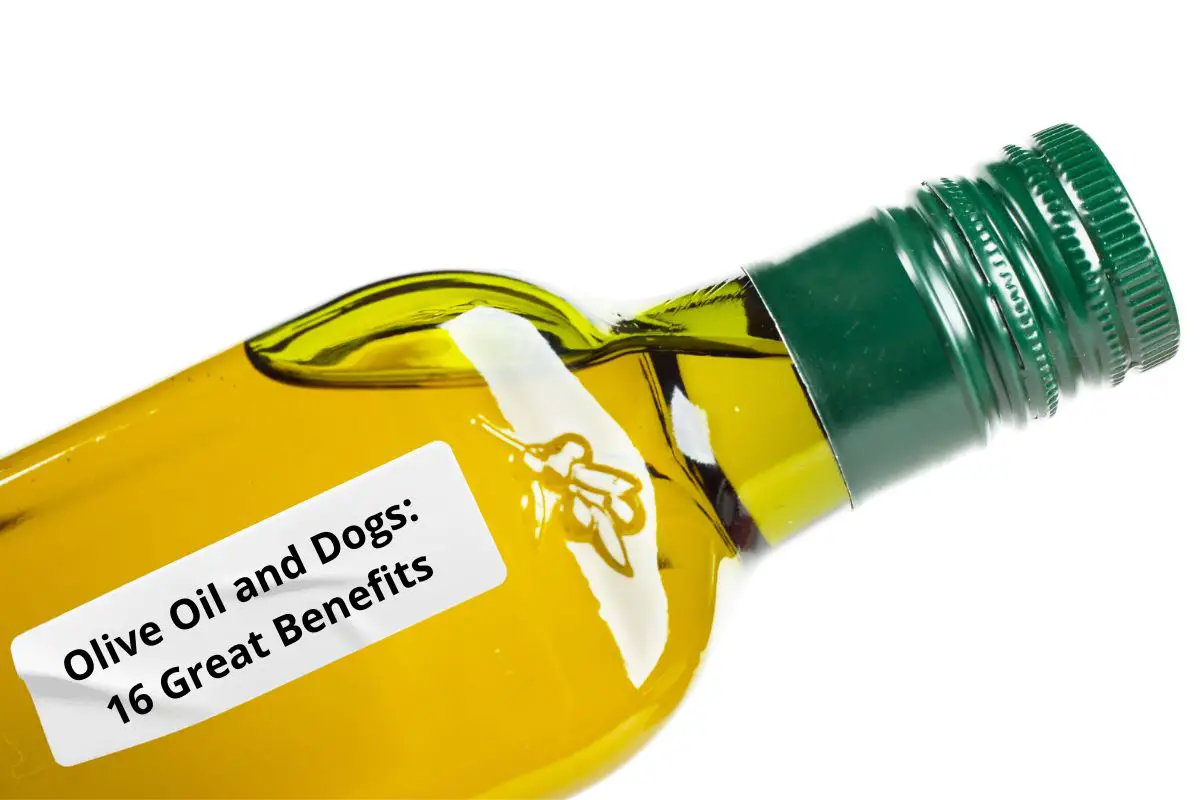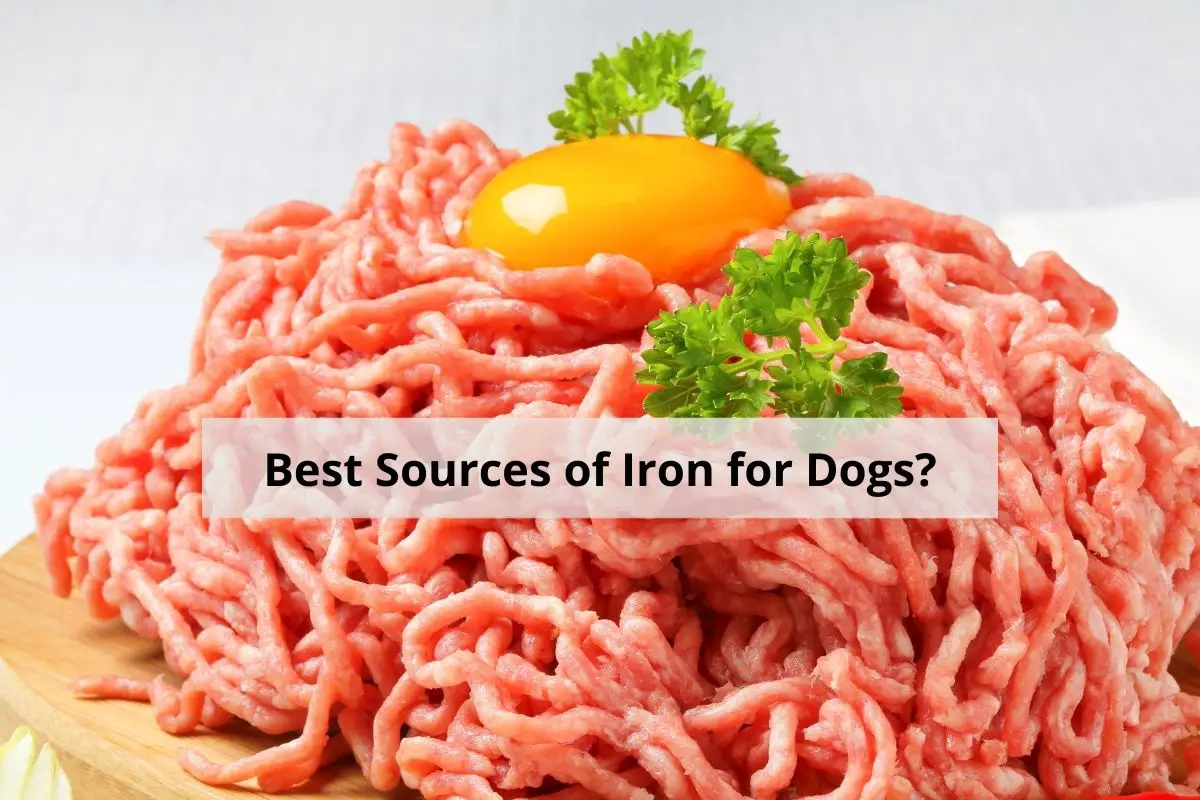This post contains affiliate links.
Dogs are known for eating anything and everything, but that doesn’t mean it is safe for them to do so. What do you do when your dog eats spoiled meat?
If your dog ate spoiled meat, monitor them for 24 hours to make sure they don’t have food poisoning. If they show signs of illness, make sure they drink lots of water, fast them for 24 hours and call a veterinarian if they continue to vomit or show other serious symptoms of sickness.
Finding out your dog ate spoiled meat can be alarming for a number of reasons. This article will discuss how food poisoning happens if dogs can get it and what the symptoms are. It will also explain different things you can do to remedy food poisoning, and when you should take your furry friend to the vet.
Table of Contents
Why Does Food Poisoning Happen?
Before getting into different ways of remedying food poisoning, it is good to know why it happens in the first place. Food poisoning happens when you digest raw or spoiled food that contains dangerous bacteria. The most common bacterias that cause illness are staphylococcus and salmonella.
When dogs ingest the bacteria, they will become sick quite quickly because the bacteria have short incubation periods.
Can Dogs Get Food Poisoning?
Before we begin, let’s explore what can actually happen if your dog eats spoiled meat. Since dogs are very different from humans and respond differently, there can be some confusion on how they react to spoiled food.
Dogs Can Get Food Poisoning, but It’s Rare
The reason why it is rare for dogs to get food poisoning is that they are made to eat many different things, things that humans would get sick if they ate. Their stomachs can handle a large variety of food (and items that aren’t necessarily food), so it is rare that they get sick.
When they do get sick, more often than not, it is not food poisoning. They are just reacting to something that is not sitting well in their stomach. A lot of veterinarians call this “garbage gut.”
The medical term for garbage gut is dietary indiscretion and refers to the gastrointestinal problems that dogs experience when they eat something that they can’t tolerate. Even so, it still is possible for dogs to get food poisoning.
Raw, Undercooked or Spoiled Meat Can Cause Food Poisoning
Even though many may feed their dog raw or spoiled meat since their stomachs are very acidic, these items can still cause serious illness for your furry friends. Spoiled meat can contain harmful bacteria that will likely cause food poisoning in your dog, and if left untreated, could cause death.
An easy way to check if the meat is spoiled is to check it’s smell, texture, and color. When you smell the meat, the smell will be very strong and pungent if it is spoiled. The meat might be slimy or sticky to the touch, and the color will tend to look a little off from the original color.
What Are the Symptoms of Food Poisoning?
There can be many symptoms of food poisoning in dogs, and it can vary from pet to pet. Some symptoms may also be more serious than others. Let’s look at all of the possible symptoms:
- Vomiting and Diarrhea – The most common sign of food-related illness in dogs is vomiting and diarrhea. Your dog can also have a fever as well.
- Reduced Appetite – An easy way to tell if your dog has food poisoning is to try and place kibble/food in front of them. If they don’t touch it, that could be a sign of illness.
- Lethargy – One of the most common signs of illness related to food is lethargy. If your dog is tired and will not move a lot, it could be a symptom.
- Dehydration – If your dog is not drinking the regular amount of water they usually do, it could be a sign that they are reacting badly to food.
- Increased Drooling – Another more common symptom of food poisoning is increased drooling. Some dogs may drool naturally, but if your dog is drooling more than usual, they could be sick.
- Uncontrollable shivering – This symptom can be hard to differentiate from fear sometimes, especially when you have a dog that gets scared easily. Uncontrollable shivering is something to watch for as a symptom of illness.
- Whimpering – Food poisoning can be very uncomfortable for your furry little friends, so they may whimper as a reaction to the pain.
- Aggression – Sometimes, uncomfortable pain or illness can cause your dog to act differently than usual. If your dog is more aggressive, this may be a sign of sickness.
- Lack of Coordination – A more serious symptom of a bad reaction is a loss of coordination. This could mean your dog has trouble walking and seems to be more clumsy than usual.
- Seizures and Loss of Consciousness – The most serious symptom of food poisoning are seizures and loss of consciousness. If this happens, a home remedy is not likely to help. Take your dog immediately to the vet.
What Do I Do if My Dog Ate Spoiled Meat and Has Food Poisoning?
When you find out your dog ate spoiled meat, or if you even suspect it, it can be very scary to watch and handle since many dog owners are not sure what to do. There are many ways you can help your dog, so let’s get into it.
Fast Your Dog for 24 Hours
Normally, dogs who have food poisoning will experience vomiting and diarrhea. This may be unpleasant to watch, but it is actually cleansing their system of poisonous food. During the first 24 hour period, you should not feed your dog anything. Just let them go through the process and allow them to rest.
Once the 24 hour period is over, and if they are finished vomiting, you can start feeding them again. Make sure to feed them only bland and soft food when first starting out before you go back to their regular food. However, if they are still vomiting after the 24 hour period, make sure to bring them to a vet.
Only Give Them Water
Since they are going to be vomiting a lot, it is very important to get them to drink water. This will prevent them from getting dehydrated. Make sure to only give them water, though, and not anything else. At this point, their stomachs will be extra sensitive, so anything other than water will upset them even more.
Some dogs don’t drink enough water, to begin with, so there are a few things you can do to make sure they don’t get dehydrated while they have food poisoning. Firstly, make sure their water bowl is near their food bowls or any other place they like to relax. Make sure the water bowl is clean as well. If they still don’t drink from the bowl, try giving them ice cubes.
Monitor Them Closely for 24 Hours
Since your dog will likely be vomiting and experiencing diarrhea for a few hours, at least more problems can arise from the symptoms themselves. This is why it is crucial to keep an eye on your pet as they go through the symptoms of food poisoning. Watch them closely for 24 hours and make sure they do not experience side effects from dehydration.
If you have tried all of the above suggestions of trying to get your dog to drink enough water and they still aren’t drinking, bring them to the vet. Dehydration can be a serious issue within itself.
Ask Your Veterinarian for Advice
While watching your dog go through food poisoning may be scary and alarming, your pet will most often be fine under your care at home. Even so, it is always a good idea to call your veterinarian for advice.
Your vet will know you and your dog well, and even if they don’t, they will have suggestions for things you can do to help your furry friend. More often than not, they will provide you, as the pet owner, with ease of mind.
Bring Your Dog to the Veterinary Clinic
Although many food poisoning cases can be easily remedied at home, there are cases where the symptoms can get worse. Let’s take a look at when you should take your dog to the vet clinic:
- When they are still vomiting after 24 hours
- When they start to vomit again after the 24 hours period
- When your dog starts vomiting water
- When your dog is showing signs of neurological issues
- When they start to seize or lose consciousness
- When you are not sure what to do
Above all else, do what you are comfortable with as the dog owner. If your dog seems to be okay, but you are still not 100% sure, bring your dog into the clinic for an exam. It is better to be safe than sorry.
Home Remedies for Vomiting
Sometimes the vet clinics aren’t open when you need them to be. There are a few home remedies that Dr. Basko recommends that you can prepare for your dog that will help with vomiting:
- Baking soda water – Mix one teaspoon with ½ cup of water and give little sips to your dog every two hours. Once they stop vomiting, you can give them some ginger tea to soothe their stomach.
- Ginger tea – Take one tablespoon of ginger root (grate it) or one teaspoon of ginger powder and mix it with ½ cup of canned coconut milk. Simmer this mixture for about ten minutes. Give 1-3 teaspoons to your dog every one to two hours.
- Pepto-Bismol – After the vomiting dies down, you can give Pepto-Bismol to your dog (this is toxic for cats, though) to soothe their stomachs. Only do this for one day. Give ¼ tab for small dogs, ½ tab for medium dogs, and one tab for large-sized dogs.
If you want some more suggestions on how to help your dog when they are vomiting, check out the video below by Doctor Lindsay:
Use Coconut Water or Coconut Juice to Help with Dehydration
As you have probably noticed, dehydration is the number one side effect of food poisoning. While this is an important issue to bring to your vet’s attention, there may be times when the clinic is closed, and you will have to resort to home remedies.
If your dog is dehydrated from vomiting and diarrhea, you can give them either coconut water or coconut juice. Check below for the proper amounts:
- Small dogs – 5 ml (0.17 fl oz) every 2 hours
- Medium dogs – 10 ml (0.34 fl oz) every 2 hours
- Large dogs – 20 ml (0.68 fl oz) every 2 hours
Related article: Can Dogs Drink Coconut Water? Let’s Find Out!
Use Rice and Coconut Milk to Help With Diarrhea
To remedy diarrhea, you can mix 1 cup of cooked white rice with ¼ cup of canned coconut milk and feed them every 3-4 hours.
- Small dogs – Feed them 1-2 tablespoons
- Medium dogs – Feed them ½ cup
- Large dogs – Feed them 1 cup
If you want to check out some more great advice from Dr. Basko, check out Fresh Food & Ancient Wisdom: Preparing Healthy & Balanced Meals For Your Dogs. This is a great book for dog owners who want to start making their own food for their pets.
What Should I Avoid Doing When Remedying Food Poisoning?
While there are many things you can do to help your dog who has food poisoning, there are also things that you shouldn’t do. Many times, dog owners do things that can actually make the illness worse.
Don’t Try to Make Your Dog Vomit
While some veterinarians may do this to cure any sort of poisoning, this can be dangerous to do if you are not trained properly. Making your dog vomit can cause them to get severely dehydrated, which can then cause a whole other mess of problems.
Usually, your vet should recommend this to you before you do it yourself. That way, they can tell you exactly how to do it safely, or they can do it themselves.
If you already did make them vomit before reading this, don’t worry too much. Just make sure to get them to drink lots of water and simply call your veterinarian.
Do Not Give Them Milk
A lot of pet owners love to give their dogs milk. Especially for dogs who are picky eaters, milk can be a gift sent from heaven because that is all they will drink when they are sick. However, milk and dairy are some of the main foods that can cause gastrointestinal issues in your pets.
With that being said, make sure to avoid giving your dog milk when they are recovering from food poisoning. Although, Dr. Ishpreet Gill at the Veterinary Medical Center does say that some dogs do not react badly to dairy. Just make sure to know how your dog reacts to dairy before giving it to them to drink.
How to Prevent Food Poisoning
Now that you know how to remedy food poisoning, the second best thing to know is how to prevent it from happening in the first place. Let’s take a look at a few easy ways to ensure your pet’s safety.
Know What Foods Are Toxic
The number one way of preventing food poisoning is knowing what foods are toxic to dogs. A lot of times, owners will give their dogs people food without even knowing if it is safe for them. It is easy to think that dogs are less sensitive than us, but they are actually more sensitive to certain foods. Avoid feeding your dogs any foods from the list below:
- Grapes (Raisins, sultanas, and currants)
- Garlic
- Onions
- Chocolate
- Caffeine
- Alcohol
- Bread dough
- Xylitol
- Macadamia nuts and walnuts
- Apple seeds, mustard seeds, apricot pits, peach pits, and cherry pits
- Avocados
- Candy
- Rhubarb leaves
- Mushroom plants
With that being said, if you know your dog has ingested any of the above food items, make sure to bring them to the veterinarian clinic immediately. These foods will affect your dog more than things like spoiled meat, and they will need special attention to recover.
Make Sure Your Dog Can’t Access Toxic Foods
Another easy way to avoid food-related illnesses for your dog is to dog-proof your house, so to speak. Make sure your pet will not have access to any toxic foods. This can be done by not leaving dangerous foods in any bottom cupboards, drawers, or on the floor.
Make sure to put the toxic foods on high shelves and cupboards. If you are unable to do that, simply purchase some containers that will be impossible for the dog to open and put the food in there.
Do Not Feed Your Pet Lots of People Food
Even though we know what foods are toxic to dogs, it is a good rule of thumb to not feed your dog a lot of people’s food. Every dog is different, and some dogs may be more sensitive than others. If you can, simply avoid feeding them food that is not made for dogs. This will prevent any health issues.
With that being said, here is a list of foods that are guaranteed to be safe for your dog’s consumption:
- Cheese
- Cooked chicken
- Carrots
- Peanut butter
- Yogurt
- Salmon
- Pumpkin
- Apple slices
- Green beans
- Eggs
- Oatmeal
- Ham
- Honey
- Peanuts
- Popcorn
- Pork
Even though your dog can eat these foods safely, you should always feed people food to them in moderation. Use people’s food for a treat now and then, or give it to them only a few times a week. Never fully replace a dog’s diet with people’s food.
Know the Different Causes of Food Poisoning
It is easy to think of food poisoning as being caused by the same things for everyone (and every dog), but there are actually a few types of food poisoning. Knowing the different types can help prevent them from happening in the first place.
- Spoiled food. The most common type of food poisoning is spoiled food. This can be caused by food that is prepared by unwashed hands or food that is not cooked properly. This then leads to dangerous bacteria and parasites that will lead to illness.
- High-fat rich food. Another type of food poisoning is caused by eating high-fat rich foods. This can lead to vomiting or diarrhea. Thirdly, allergic reactions can be a type of food poisoning. Dog’s may be allergic to certain preservatives or types of food that can cause rashes, vomiting, or diarrhea.
- Overeating. Lastly, food poisoning can also be caused by overeating. Some dogs may simply eat too much food and become sick. For those dogs, making sure they have a controlled diet is important.
My Dog Ate Spoiled Meat but Doesn’t Appear to Have Food Poisoning – What Do I Do?
There are some cases where you know your dog ate spoiled meat, but they are not exhibiting any signs of food poisoning. It is possible that they are simply not reacting to it. Some dogs are more sensitive than others, so your dog may have a stomach that can handle food better, or the symptoms may be taking longer to set in.
There are a few things to do when you know your dog ate bad meat, but they aren’t showing signs of illness.
Monitor Them for 24 Hours
Even if they appear fine, food poisoning symptoms can still happen a few hours after they ate any bad food. Make sure to watch them closely for the next 24 hours and make sure they don’t have any food poisoning signs. If symptoms do show up, refer to the information above to treat them.
Make Sure They Drink More Water Than Usual
Even if your dog does not get sick from eating the spoiled meat, it is always a good idea to make sure they drink lots of water. Your dog may even be reacting to the meat and is just not showing the more obvious signs of illness. They could be experiencing symptoms such as aches and cramps that are impossible to see.
If your dog appears to be hungry and is not showing signs of food poisoning, make sure they only eat bland and wet food. When going back to their hard food, make sure to do it slowly just in case they are not feeling well.
Call Your Veterinarian
As mentioned before, it is always a good idea to call your veterinarian. Your vet may know more about your dog than you do, and they might have some suggestions and things to look for that could be other, less obvious signs of food poisoning.
What Else Can Give My Dog Food Poisoning?
Now that we know how to deal with food poisoning and that it’s not very common, it is good to know what other things can cause it. Since food poisoning can be a serious issue, it is important to consciously keep your dog away from other things that might make them severely sick.
Dead Animals
This is usually a problem if you live in the country or on an acreage. If your dog is outside a lot, there is a chance of them getting into roadkill or dead animals in the bush. This can be dangerous for your dog because some dead animal meat may have bacteria or parasites that could cause serious illness.
Garbage and Compost
Even though many think that it’s okay for dogs to go through trash since they can handle different things than humans, this can still be dangerous for them. Any rotten meat or mold that dogs eat can cause food poisoning, so it is important to make sure that any garbage or compost is out of reach of your furry friends.
Recalled Dog Food and Treats
A big thing to watch out for is any recalled dog food or treats. Any food or treats that have been recalled can potentially cause food poisoning in your dogs. You can easily check for recalls on the FDA website.
Fecal Matter
Especially when you are taking your dogs for walks, something to watch out for is fecal matter. While many dogs simply sniff it, there are some who will eat the fecal matter. The matter can contain dangerous bacteria that can lead to serious illness.
Conclusion
If your dog ate spoiled meat, you should monitor them for at least 24 hours and give them lots of water. If they show signs of food poisoning, there are a few things you can do. Make sure they drink lots of water, fast them for 24 hours, call a veterinarian for advice or visit the vet if your dog is showing serious symptoms like seizing and loss of consciousness.
You can also use coconut water, coconut juice, or coconut milk as home remedies for dehydration and diarrhea. There are also three home remedies to help with vomiting, including baking soda water, ginger tea, and Pepto Bismol. Finally, make sure not to try and make your dog vomit and do not give them milk.
Related Articles
- Your Dog Ate Your AirPods: Here’s What To Do About It
- Your Dog Ate a Q-tip: Here’s What to Do About It
- Feeding Your Dogs Baby Food: Yay or Nay?
Sources
- PetMD: Can Dogs Get Food Poisoning?
- PetMD: The Truth About Dairy Products and Pets
- Dr. Basko: Top Natural Home Remedies for Digestive Emergencies in Pets
- AKC: Is Your Puppy Drinking Enough Water?
- Pet Wellbeing: What Did He Eat? Signs Your Dog Has Food Poisoning
- All Paws Veterinary Clinic: Signs of Food Poisoning in Pets
- Canna-Pet: Food Poisoning in Dogs
- Frontiers in Veterinary Science: Veterinary Pharmacology and Toxicology: Household Food Items Toxic to Dogs and Cats
- Vet Learn: Hidden Dangers in the Kitchen
- The Humane Society: Foods that can be poisonous to pets
- Spoon University: How to Tell When Good Meat Has Gone Bad
- Cesar’s Way: Dog Approved People Food That, Will Not Harm
- Wikipedia: Incubation Period
Mrdogfood.com is a participant in the Amazon Services LLC Associates Program, an affiliate advertising program designed to provide a means for sites to earn advertising fees by advertising and linking to Amazon.com. We also participate in other affiliate programs which compensate us for referring traffic.




